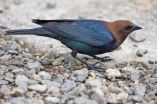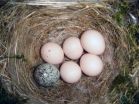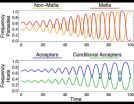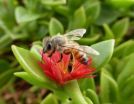(Press-News.org) This news release is available in German.
If a restaurant owner fails to pay the protection money demanded of him, he can expect his premises to be trashed. Warnings like these are seldom required, however, as fear of the consequences is enough to make restaurant owners pay up. Similarly, mafia-like behaviour is observed in parasitic birds, which lay their eggs in other birds' nests. If the host birds throw the cuckoo's egg out, the brood parasites take their revenge by destroying the entire nest. Consequently, it is beneficial for hosts to be capable of learning and to cooperate. Previously seen only in field observations, scientists at the Max Planck Institute for Evolutionary Biology in Plön have now modelled this behaviour mathematically to confirm it as an effective strategy.
Some parasitic birds, such as the North American brown-headed cowbird (Molothrus ater), are observed to punish host birds by destroying their clutches if their eggs are rejected. Consequently, the hosts accept a certain degree of parasitism as long as they can raise their own offspring alongside the parasitic chicks. "We tested and confirmed the mafia hypothesis, which was controversial among scientists," explains Maria Abou Chakra, lead author of the study. The parasitic birds use their behaviour to extort the hosts, forcing them to cooperate. "They give the hosts no choice. If they wish to avoid retaliation, they need to keep the foreign egg."
For the theory to work, two points are absolutely crucial: the host birds must be capable of learning, and the parasites must approach the same nests more than once. Only then does the mafia-like behaviour have the desired effect. "For the hosts, the best thing is to remove the foreign egg from their own nests. But if they encounter a retaliatory parasite that destroys their nest, it's best to adapt and accept the parasitic egg," says Abou Chakra.
Maria Abou Chakra works in the Evolutionary Theory Department at the Max Planck Institute for Evolutionary Biology. In collaboration with Christian Hilbe, now at Harvard University, and Arne Traulsen, she developed mathematical models to test the mafia hypothesis. The underlying principle in their minimalistic model was that each parasite lays no more than one egg in another bird's nest, which the host may accept or eject. A more complex model allowed the parasites to lay several eggs, each of which could be destroyed or accepted individually.
"Biologists prefer the complex model, because it is closer to reality. But we came to the same conclusion with both models: the dynamics of the interaction between host and parasite is cyclical." An equilibrium is never established; instead, there are regular cycles in terms of the frequency of mafia and non-mafia parasites and hosts that accept an egg immediately or only after they have suffered retaliation. If the number of non-mafia brood parasites is high, the advantage lies with conditional accepters, hosts that leave the parasite's egg in their nest only after their nest has been destroyed. After all, there is little chance the parasite is a retaliator. This behaviour therefore increases among host birds. And this, in turn, improves the survival rate of the mafia-like brood parasites. As soon as the latter are in the majority, it makes sense for the hosts to accept unconditionally, which, in turn, renders the mafia-like behaviour unnecessary. The cycle begins anew.
Evolutionary biologist Amotz Zahavi postulated the mafia hypothesis back in 1979. It has been contentious ever since. Critics argue that the retaliation gives the parasites no advantage, carrying high costs instead. However, the future nestlings benefit from the hot-headed behaviour if the host parents do indeed keep and hatch the next cuckoo's egg for fear of having their nest destroyed again.
Instead of retaliating, the parasites could attempt to mimic the eggs of the host birds. This makes it more difficult for hosts to identify and destroy the foreign egg. There are some birds which do in fact apply this strategy. But Abou Chakra sees an advantage in the mafia-like behaviour itself: "We believe it helps the parasites to avoid specialisation." Birds that do not adapt the size and colour of their eggs to any particular host can foist their offspring on nearly any species of bird and use their behaviour to force the foster parents to raise it. "The question is, what are the conditions under which it's better for parasites to specialise and when does mafia-like behaviour pay off?" This is what the scientists intend on testing next.
INFORMATION:
Original publication
Maria Abou Chakra, Christian Hilbe & Arne Traulsen
Plastic behaviors in hosts promote the emergence of retaliatory parasites
Scientific Reports, 4 March 2014; doi:10.1038/srep04251
Fear of the cuckoo mafia
For fear of retaliation, birds accept and raise brood parasites' young
2014-04-17
ELSE PRESS RELEASES FROM THIS DATE:
East African honeybees are safe from invasive pests… for now
2014-04-17
Several parasites and pathogens that devastate honeybees in Europe, Asia and the United States are spreading across East Africa, but do not appear to be impacting native honeybee populations at this time, according to an international team of researchers.
The invasive pests include including Nosema microsporidia and Varroa mites.
"Our East African honeybees appear to be resilient to these invasive pests, which suggests to us that the chemicals used to control pests in Europe, Asia and the United States currently are not necessary in East Africa," said Elliud Muli, senior ...
Drought and fire in the Amazon lead to sharp increases in forest tree mortality
2014-04-17
Ongoing deforestation and fragmentation of forests in the Amazon help create tinderbox conditions for wildfires in remnant forests, contributing to rapid and widespread forest loss during drought years, according to a team of researchers.
The findings show that forests in the Amazon could reach a "tipping point" when severe droughts coupled with forest fires lead to large-scale loss of trees, making recovery more difficult, said Jennifer Balch, assistant professor of geography, Penn State.
"We documented one of the highest tree mortality rates witnessed in Amazon forests," ...
Classifying cognitive styles across disciplines
2014-04-17
Educators have tried to boost learning by focusing on differences in learning styles. Management consultants tout the impact that different decision-making styles have on productivity. Various fields have developed diverse approaches to understanding the way people process information. A new report from psychological scientists aims to integrate these disciplines by offering a new, integrated framework of cognitive styles that bridges different terminologies, concepts, and approaches.
"This new taxonomy of cognitive styles offers a clear categorization of different types ...
Unraveling the 'black ribbon' around lung cancer
2014-04-17
It's not uncommon these days to find a colored ribbon representing a disease. A pink ribbon is well known to signify breast cancer. But what color ribbon does one think of with lung cancer?
Although white has been identified as the designated color, for many suffering from the disease, black may be the only one they think fits.
A Michigan State University study consisting of lung cancer patients, primarily smokers between the ages of 51 to 79 years old, is shedding more light on the stigma often felt by these patients, the emotional toll it can have and how health providers ...
Some immune cells defend only 1 organ
2014-04-17
Scientists have uncovered a new way the immune system may fight cancers and viral infections. The finding could aid efforts to use immune cells to treat illness.
The research, in mice, suggests that some organs have the immunological equivalent of "neighborhood police" – specialized squads of defenders that patrol only one area, a single organ, instead of an entire city, the body.
Scientists at Washington University School of Medicine in St. Louis have shown that the liver, skin and uterus each has dedicated immune cells, which they call tissue-resident natural killer ...
Deaths from viral hepatitis surpasses HIV/AIDS as preventable cause of deaths in Australia
2014-04-17
The analysis was conducted by Dr Benjamin Cowie and Ms Jennifer MacLachlan from the University of Melbourne and Melbourne Health, and was presented at The International Liver Congress in London earlier this month.
"Liver cancer is the fastest increasing cause of cancer deaths in Australia, increasing each year by 5 per cent, so by more than seventy people each year. In 2014 there was an estimated number of deaths of around 1,500 from liver cancer. The predominant cause is chronic viral Hepatitis," Dr Cowie said.
Hepatitis refers to the inflammation of the liver. Chronic ...
Ancient sea-levels give new clues on ice ages
2014-04-17
International researchers, led by the Australian National University (ANU), have developed a new way to determine sea-level changes and deep-sea temperature variability over the past 5.3 million years.
The findings will help scientists better understand the climate surrounding ice ages over the past two million years, and could help determine the relationship between carbon dioxide levels, global temperatures and sea levels.
The team from ANU, the University of Southampton (UoS) and the National Oceanography Centre (NOC) in the United Kingdom, examined oxygen isotope ...
Scientists find new way to fight malaria drug resistance
2014-04-17
An anti-malarial treatment that lost its status as the leading weapon against the deadly disease could be given a new lease of life, with new research indicating it simply needs to be administered differently.
The findings could revive the use of the cheap anti-malarial drug chloroquine in treating and preventing the mosquito-bourne disease, which claims the lives of more than half a million people each year around the world.
The parasite that causes malaria has developed resistance to chloroquine, but research carried out at the Australian National University (ANU) ...
Newlyweds, be careful what you wish for
2014-04-17
A statistical analysis of the gift "fulfillments" at several hundred online wedding gift registries suggests that wedding guests are caught between a rock and a hard place when it comes to buying an appropriate gift for the happy couple. The details reported in the International Journal of Electronic Marketing and Retailing suggest that most people hope to garner social benefits of buying an expensive gift that somehow enhances their relationship with the newlyweds while at the same time they wish to limit monetary cost and save money.
Yun Kyung Oh of the Department of ...
More research called for into HIV and schistosomiasis coinfection in African children
2014-04-17
Researchers from LSTM have called for more research to be carried out into HIV and schistosomiasis coinfection in children in sub-Saharan Africa. In a paper in The Lancet Infectious Diseases LSTM's Professor Russell Stothard, working with colleagues in the department of Parasitology and researchers from Cape Western Reserve University, in Cleveland Ohio, University of Cambridge and the Royal Veterinary College looked at previous research into the joint burden of HIV/AIDS and schistosomiasis of children, and found that while disease-specific control interventions are continuing, ...
LAST 30 PRESS RELEASES:
New study identifies growth hormone receptor as possible target to improve lung cancer treatment
Routine helps children adjust to school, but harsh parenting may undo benefits
IEEE honors Pitt’s Fang Peng with medal in power engineering
SwRI and the NPSS Consortium release new version of NPSS® software with improved functionality
Study identifies molecular cause of taste loss after COVID
Accounting for soil saturation enhances atmospheric river flood warnings
The research that got sick veterans treatment
Study finds that on-demand wage access boosts savings and financial engagement for low-wage workers
Antarctica has lost 10 times the size of Greater Los Angeles in ice over 30 years
Scared of spiders? The real horror story is a world without them
New study moves nanomedicine one step closer to better and safer drug delivery
Illinois team tests the costs, benefits of agrivoltaics across the Midwest
Highly stable self-rectifying memristor arrays: Enabling reliable neuromorphic computing via multi-state regulation
Composite superionic electrolytes for pressure-less solid-state batteries achieved by continuously perpendicularly aligned 2D pathways
Exploring why some people may prefer alcohol over other rewards
How expectations about artificial sweeteners may affect their taste
Ultrasound AI receives FDA De Novo clearance for delivery date AI technology
Amino acid residue-driven nanoparticle targeting of protein cavities beyond size complementarity
New AI algorithm enables scientific monitoring of "blue tears"
Insufficient sleep among US adolescents across behavioral risk groups
Long COVID and recovery among US adults
Trends in poverty and birth outcomes in the US
Heterogeneity of treatment effects of GLP-1 RAs for weight loss in adults
Within-person association between daily screen use and sleep in youth
Low-dose lithium for mild cognitive impairment
Catheter ablation and oral anticoagulation for secondary stroke prevention in atrial fibrillation
A new theory of brain development
Pilot clinical trial suggests low dose lithium may slow verbal memory decline
Bioprinting muscle that knows how to align its cells just as in the human body
A hair-thin fiber can read the chemistry of a single drop of body fluid
[Press-News.org] Fear of the cuckoo mafiaFor fear of retaliation, birds accept and raise brood parasites' young





